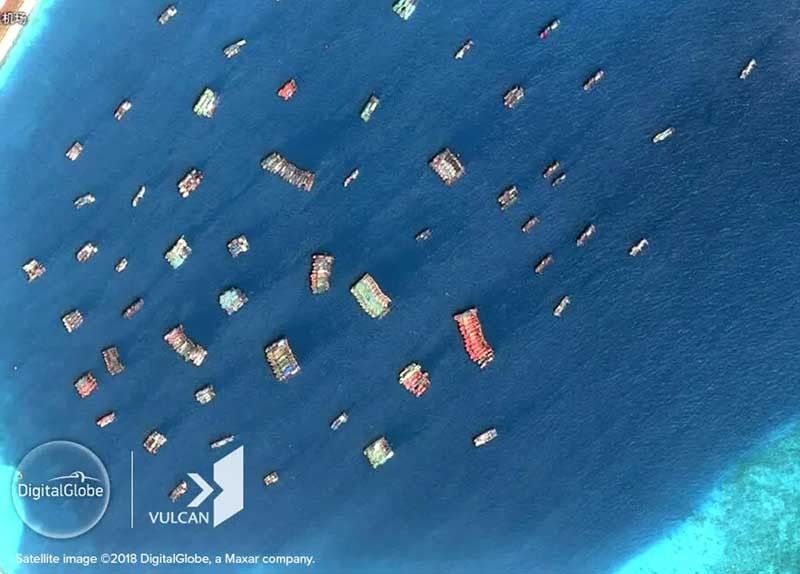Palace leaving increased South China Sea presence to security agencies

MANILA, Philippines — Malacañang is leaving it to security agencies to deal with the reported “massive” presence of Chinese ships in South China Sea areas that are being claimed by the Philippines.
A recent article by American think tank Asia Maritime Transparency Initiative (AMTI) expressed concern over the “unseen” fishing activity in the region, “massive overcapacity” in the Spratlys and the “stunning scale and expense of the maritime militia” in the disputed area.
Based on photos taken in the area, AMTI said most of the ships operating in the Spratlys are from China, many of which congregate in lagoons at Zamora (Subi) and Panganiban (Mischief) Reefs, and in nearby waters including around Philippine-held islets, the think tank said.
The number of Chinese ships at Zamora and Panganiban was reportedly much higher last year than in 2017, reaching as high as about 300 ships anchored at the two reefs last August.
According to the think tank, the size and quantity of Chinese ships observed in the Spratlys suggest a “massive overcapacity” because the more than 270 fishing boats present at Zamora and Panganiban Reefs in August could catch nearly 1.2 million metric tons per year or between 50 and 100 percent of the total estimated catch in the Spratly Islands.
The “gross overcapacity” and the ships’ tendency to congregate around reefs occupied by China and other claimants led to the conclusion that most of these vessels serve, at least part-time, in China’s maritime militia, the think tank said.
Presidential spokesman Salvador Panelo said state agencies overseeing the South China Sea would respond accordingly if a security threat arises.
“I’m sure whoever is authorized to oversee that area knows what to do if they feel there is a security threat... We also go to areas they claim to be theirs and they allow us to fish. There is no problem if they are just fishing,” Panelo said at a press briefing, citing the defense department in particular as among those monitoring the developments.
Panelo said claims that not all Chinese ships in Spratlys were carrying fishermen were mere speculations until validated.
Malacañang also described as “speculative” concerns that Chinese firms might take over the business of financially troubled South Korean shipbuilder Hanjin Heavy Industries and Construction Philippines (HHIC-Phil).
In a recent social media post, former Navy chief Alexander Pama described the development involving Hanjin as a “national security issue,” noting that the owners of the company’s shipyard in Subic Bay have unlimited access to one of the Philippines’ most strategic geographic naval and maritime assets.
“Although it is a commercial shipyard, nothing can prevent the owners from making it into a de-facto naval base and a maritime facility for other security purposes. Let us all be aware and wary of the serious security and other strategic implications of this issue,” Pama said.
“I urge our patriotic business community and the government not to allow Hanjin Shipyard to fall into the wrong hands,” he added.
The trade department previously said two Chinese firms have inquired about the local affiliate of Hanjin, which has filed for voluntary rehabilitation because of heavy financial losses.
The chair of labor coalition Nagkaisa, Sonny Matula, also cautioned the government against allowing China to own Hanjin.
Matula expressed belief that allowing the shipyard to fall into the hands of China could trigger security concerns.
“In taking over the shipyard, we encourage the government to explore technical cooperation with other ship building countries that have no territorial ambitions in the region such as Norway,” Matula said.
Matula noted that Norway has a robust shipbuilding industry and had helped the government in trying to forge peace with the National Democratic Front (NDF).
Asked to react to Pama’s concerns, Panelo said: “The claim that they (Chinese firms) would take over (the business of Hanjin) is just speculation.”
“We are not concerned about other countries yet we are concerned about China?” he added.
Panelo claimed a Filipino firm also wants to take over the business of Hanjin’s local affiliate but did not elaborate.
“Many shipping firms in the Philippines can afford that so let’s wait,” he added.
Meanwhile, Labor and Employment Secretary Silvestre Bello III said he is set to meet with senior department officials this morning to discuss possible contingency measures to cushion the impact of the HHIC-Phil multimillion debt problem that could lead to the mass displacement of its workers.
Based on information reaching the DOLE, about 7,000 workers could be affected in case Hanjin is left with no resort but to declare bankruptcy.
The shipbuilding company terminated over 11,000 workers last year.
- Latest
- Trending





























